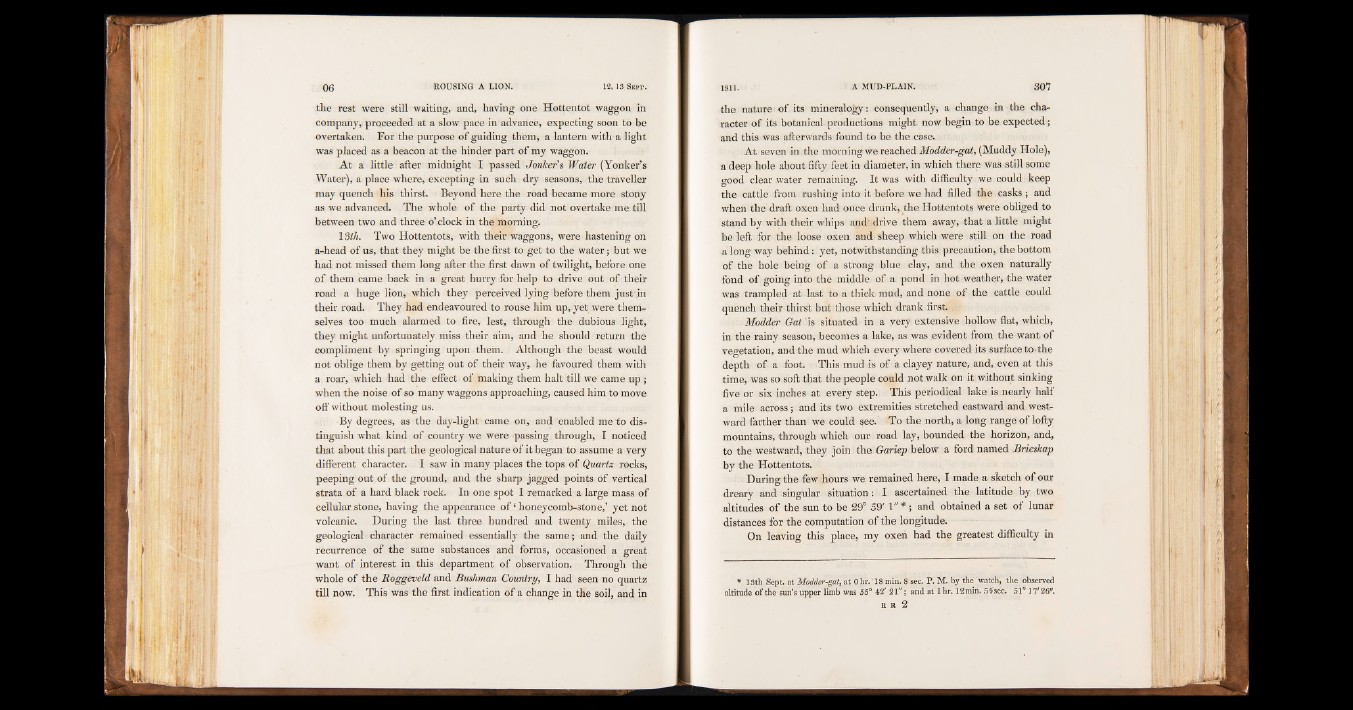
the rest were still waiting, and, having one Hottentot waggon in
company, proceeded at a slow pace in advance, expecting soon to be
overtaken. For the purpose of guiding them, a lantern with a light
was placed as a beacon at the hinder part of my waggon.
At a little after midnight I passed Jonkers Water (Yonker’s
Water), a place where, excepting in such dry seasons, the traveller
may quench his thirst. Beyond here the road became more stony
as we advanced. The whole: of the party did not overtake me till
between two and three o’clock in the morning.
13th. Two Hottentots, with their waggons, were hastening on
a-head of us, that they might be the first to get to the water; but we
had not missed them long after the first dawn of twilight, before one
of them came back in a great hurry for help to drive out of their
road a huge lion, which they perceived lying before them just .in
their road. They had endeavoured to rouse him up, yet were themselves
too much alarmed to fire, lest, through the dubious light,
they might unfortunately miss their aim, and he should return the
compliment by springing upon them. Although the beast would
not oblige them, by getting out of their way, he favoured them with
a roar, which had the effect of making them halt till we came up ;
when the noise of so many waggons approaching, caused him to move
off without molesting us.
By degrees, as the day-light came on, and enabled me to distinguish
what kind of country we were passing through, I noticed
that about this part the geological nature of it began to assume a very
different character. I saw in many places the tops of Quartz rocks,
peeping out of the ground, and the sharp jagged points of vertical
strata of a hard black rock. In one spot I remarked a large mass of
cellular stone, having the appearance of ‘ honeycomb-stone,’ yet not
volcanic. During the last three hundred and twenty miles, the
geological character remained essentially the same; and the daily
recurrence of the same substances and forms, occasioned a great
want of interest in this department of observation. Through the
whole of the Roggeveld and Bushman Country, I had seen no quartz
till now. This was the first indication of a change in the soil, and in
the nature of its mineralogy: consequently, a change in the character
of its botanical productions might now begin to be expected ;
and this was afterwards found to be the case.
At seven in the morning we reached Modder-gat, (Muddy Hole),
a deep hole about fifty feet in diameter, in which there was still some
good clear water remaining. It was with difficulty we could keep
the cattle from rushing into it before we had filled the casks ; and
when the draft oxen had once drunk, the Hottentots were obliged to
stand by with their whips and" drive them away; that a little might
be left for the loose oxen and sheep which were still on the road
a long way behind: yet, notwithstanding this precaution, the bottom
of the hole being of a strong blue clay, and the oxen naturally
fond of going into the middle of a pond in hot weather, the water
was trampled at last to a thick mud, and none of the cattle could
quench their thirst but those which drank first.
Modder Gat is situated in a very extensive hollow flat, which,
in the rainy season, becomes a lake, as was evident from the want of
vegetation, and the mud which every where covered its surface to-the
depth of a foot. This mud is of a clayey nature, and, even at this
time, was so soft that the people could not walk on it without sinking
five or six inches at every step. This periodical lake is nearly half
a mile across; and its two extremities stretched eastward and westward
farther than we could see. To the north, a long range of lofty
mountains, through which our road lay, bounded the horizon, and,
to the westward, they join the Gariep below a ford named Brieskap
by the Hottentots.
During the few hours we. remained here, I made a sketch of our
dreary and singular situation: I ascertained the latitude by two
altitudes of the sun to be 29° 59' 1" * ; and obtained a set of lunar
distances for the computation of the longitude.
On leaving this place, my oxen had the greatest difficulty in
* 13 th Sept. at Modder-gat, at O hr.18 min. 8 sec. P. M. by the watch, the observed
altitude of the sun’s upper limb was 55° 42' 21” ; and at lh r . 12miri. 54'sec. 51° 17f 26".